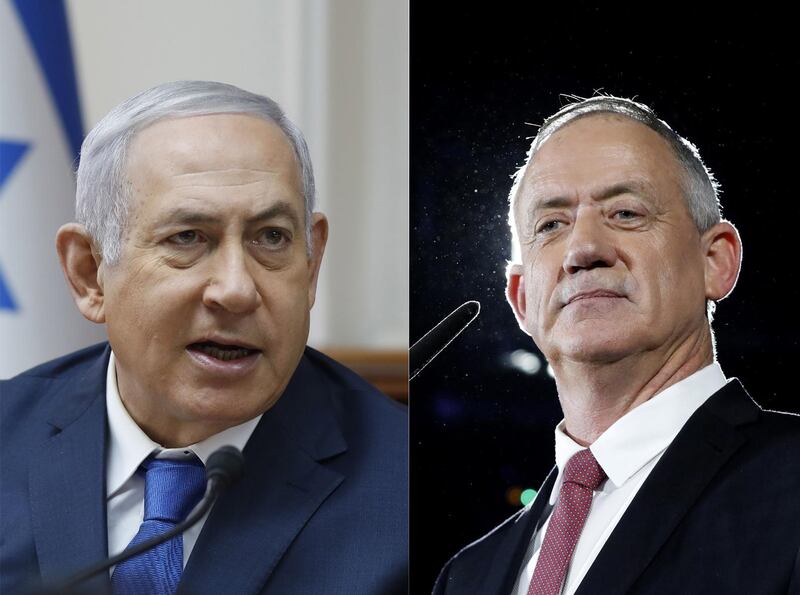Israel’s election front runners Prime Minister Benjamin Netanyahu and opposition leader Benny Gantz made their final pitches to voters on Monday ahead of a vote that could bring the end to the former’s stint as one of the country’s longest-serving leaders.
The race is expected to be close, with Mr Gantz just ahead in the polls for seats in Israel’s 120-seat parliament, but Mr Netanyahu has pulled out all the stops to extend his 13 years in power and become Israel’s longest-serving premier.
He warned voters that there was a coordinated campaign to remove him from office and that he was at risk of losing his seat. Mr Gantz said that Mr Netanyahu’s time was up and that Israel needed change.
Israeli elections never produce an outright majority winner and always result in the formation of a coalition. Even if Mr Gantz garners more seats than Israel’s leader, Mr Netanyahu's support from smaller right-wing and ultranationalist parties will likely see him be able to cajole a coalition of 60 or more seats before Mr Gantz.
"Who else can do this? Who can do this? Come on. Honestly," Mr Netanyahu said, making the case as he has throughout the campaign that he is Israel's essential statesman.
"Who can stand in front of the world? Who can stand in front of the American Congress? Who can move public opinion in that direction?"
He also made a last-ditch appeal to right and far-right voters, pledging to annex areas of the occupied West Bank and bringing Israel’s illegal settlement outposts under Israeli sovereignty. That move would deny the Palestinians any future state that could be contiguous in nature and therefore kill any hopes of the two-state solution.
Mr Gantz has called Mr Netanyahu's pledge an "irresponsible" bid for right-wing votes.
He said he favours a "globally backed peace agreement" that sees Israel hold on to the large settlement blocs in the West Bank and maintain security control over the territory.
Mr Gantz has also highlighted his security credentials while saying he will heal divisions he accuses Mr Netanyahu of exacerbating.
"There's a need for change and an opportunity for change," Mr Gantz told Israel's army radio on Monday.
"Israel needs to choose a direction of unification, connection and hope – or of extremity."
The two were also engaging in typical pre-election campaigning, including Mr Gantz riding a motorcycle to his rally on Sunday and Netanyahu visiting Jerusalem's main market on Monday.
Mr Netanyahu will be on track to surpass founding father David Ben-Gurion as Israel's longest-serving prime minister should he win on Tuesday.
But even if he does, he faces the prospect of becoming the first sitting prime minister to be indicted.
The attorney general has announced he intends to indict Mr Netanyahu for bribery, fraud and breach of trust pending an upcoming hearing. The prime minister called an early election to stave off the prospect of facing a hearing without a fresh mandate.
The premier's opponents have seized on the allegations to argue that Mr Netanyahu, 69, has lost his way and must go.
But Mr Netanyahu has been defiant, calling the investigations a "witch hunt" and denouncing journalists reporting on them – similar to the tactics used by his ally Mr Trump.
While the threat of indictment hangs over Mr Netanyahu, he has also built a reputation as guarantor of Israel's security and economic growth.
He has repeatedly spoken of Mr Trump's recognition of the disputed city of Jerusalem as Israel's capital and Israel's sovereignty over the Golan Heights as two of his major accomplishments.
Mr Gantz has sought to overcome that in part by allying with two other former military chiefs of staff and ex-finance minister Yair Lapid.
If Mr Netanyahu’s Likud wins the most seats then President Reuven Rivlin will almost surely ask him to form a government. If Mr Gantz’s Blue and White alliance defeats the Likud by a significant number of seats then Mr Rivlin may then ask Mr Gantz to form a government. Mr Gantz would probably attempt to do so with a combination of parties on the left and right.
While Mr Gantz publicly rules it out, there is the possibility that Likud and Blue and White negotiate to form a unity government.
That scenario could be in place if some of the smaller right-wing parties Mr Netanyahu would rely on to form a coalition fail to receive the 3.25 per cent of the vote required to enter parliament and Mr Gantz is unable to form a government on his own.






